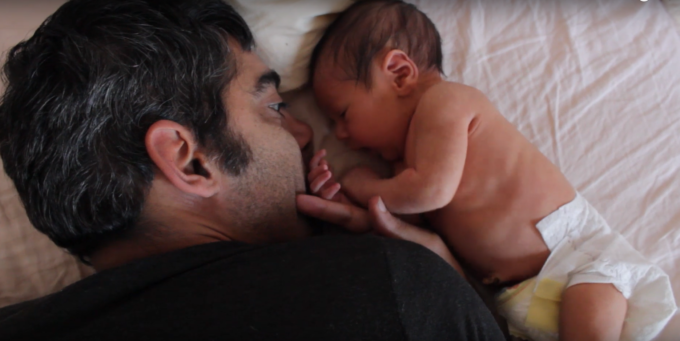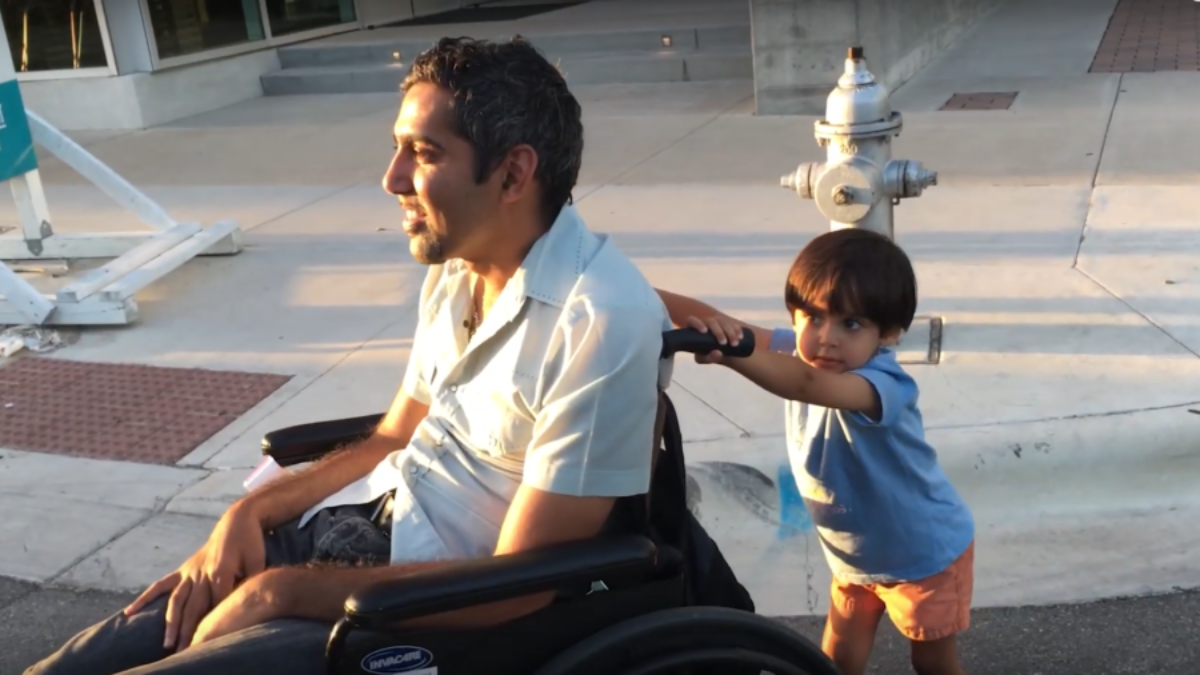Written By: Demi Guo
An hour after “When We Walk” finished screening, I’m finally able to nab him. “He’s so popular!” I whispered to one of his adoring friends. But right before he and his editor can start answering my questions, Jason DaSilva gets a call.
That’s one of the frames you’ll familiarize yourselves with when you watch his documentary: DaSilva and his son, Jase, Skyping. Its prequel, “When I Walk,” covers the early days of when multiple sclerosis paralyzed DaSilva’s body. “When We Walk” shows you how hard he tries to close the distance between himself and his son.
It’s also addressed to him. The documentary is a planned mishmash of animated graphics and home video footage. The former explains what multiple sclerosis even is. The latter shows DaSilva’s struggles as the disease slowly takes over his body. Essentially, it shows the physical world while musing on things that cannot be captured on camera: the future. How, through the stages for multiple sclerosis, DaSilva loses mobility, slowly loses his vision, and ultimately his life before Jase is fully grown.
He published a part of the film in a New York Times op-doc titled “How Health Care Makes Disability a Trap.” That’s because the film plot goes like this: When Jase and his mother move to Texas, DaSilva tries to do the same, only to realize that it’s the worst state for healthcare in the United States. He needs 24-hour care to do anything, but Medicaid doesn’t provide it there. The only other options are either a nursing home or a six-month to three-year waiting list to get up to only 50 hours of care a week.
“What occurred in this film is nothing that should ever happen to anybody,” DaSilva told me, “but stories like this are happening.” He was straightforward. “For a father to get separated from his son, it just keeps me up at night, and I can’t concentrate on work properly. But it’s crazy, that it’s all because of Medicaid that I can’t be around him.”
He also had a clear path in mind. “It’s to get out there in front of people, and say, ‘Please start making changes.’”

Right now, DaSilva made a point of saying, it means supporting the Disability Integration Act. In one summary provided by the Congressional Research Service, it “… prohibits government entities and insurance providers from denying community-based services to individuals with disabilities that require long-term service or support that would enable such individuals to live in the community and lead an independent life.”
It is a bipartisan bill that was introduced this January. “We need votes to make it a reality,” he said, “so get out there and call your local Congressmen.” He punctuated this call to action with the reminder that he, among others who live with disabilities, cannot travel outside their state borders because of the current restrictions of healthcare.
That brings us to the emotional pull of the narrative. “That was a really important part of the film,” Simeon Hutner, the film’s editor, said. “The dissolution of the relationship, and we kind of trace that from the beginning, where we can see that they’re very much in love, and then through a point where that ends and they leave.”
DaSilva tells Jase through the narration about his love story with his wife, Alice Cook, and how eventually the struggle to care for both of them finally leads to her leaving for Texas. “I just saw her love for me,” he says in the voiceover, “not her concern about the burden she was taking on.”
It may be hard to watch the scene when they move away. DaSilva spares no details capturing every moment, and I don’t dare spoil the visuals and subjects he talks about. It needs to be seen, in order to have its rawness appreciated. This is a man with nothing to lose in regards to what he tells his child about himself.
“When we were editing that, we always came back to these themes,” Hutner said. “When we were looking at this footage, we would always say, ‘How can we relate this theme to the father and the son?’”
They are currently working through “When They Walk,” which, DaSilva explained, is meant to be the third and final installment of the series. He spoke at length about how it would use the colors of white, blue and red to convey the raw passion of the disability movement.
His eye for style goes back to the beginning. He has a Masters in media arts, but his background is in drawing and painting, hence the mix of video with graphics. “I just made one documentary, and that ended up being my grad project,” he said. “So, because of that, it was in Sundance. So, because this is in Sundance, I thought, ‘Oh, wow. I guess I’ll be a filmmaker now.’”
“The animation provides another dimension to the film,” Hutner said. It could portray graphs explaining the stages of multiple sclerosis, his own thoughts in large, expressive letters and Jase himself, floating through space as whichever man he may grow up to be.
“When They Walk” has already been selected by the Documentary For Social Change Award by the Center for Asian American Media, with the official announcement explaining how it now broadens the perspective to focus on the world DaSilva lives in. If “When I Walk” was a call to action, then “When We Walk” will be more pointed, through a megaphone. “This time the lens is political,” the announcement says.
Certainly, DaSilva has been vocal and activist. He has the little blue checkmark next to his name on social media, after all. He founded the non-profit organization AXS Lab and AXS Map, a crowdsourced Google map-based platform that’s the Yelp of accessible businesses.
“When I Walk” received an Emmy in 2015, and DaSilva himself has received numerous awards. This lengthy spool of achievements brings him to numerous events honoring his work, including our own Asian American International Film Festival.
He tells his son that he’s too busy right now — the Sanskrit poem tattooed on his right bicep, “Nothing is greater than truth,” showing as he moves his phone — and that he’ll call him back later. He pans his phone camera to show Jase the scope of the room, and I wave. Jase babbles on the other end, and we hear him play a piano. DaSilva compliments him, but tells him, gently, that he has to go. They say goodbye, and hang up.
I start my interview.
Director: Jason DaSilva
Stars: Jason DaSilva
Running Time: 1 hour 17 minutes
Genre: Documentary

